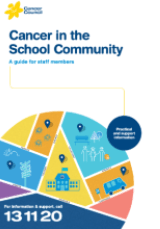- Home
- About Cancer
- Schools and teachers
- Cancer in the school community
- Talking about cancer in schools
- Understanding differences
Understanding differences
It can be difficult to gauge the right level of contact and how much support is needed and welcomed by a family. The school community plays a central role in the lives of some families, but for others – often those with strong family networks – it is not as important. A family may not want help from the school.
Cultural sensitivity and diverse beliefs
If your school community includes diverse cultural groups, people will probably have different values and beliefs about health care. This will affect how they understand cancer and the level of stigma they attach to the disease. It can also influence how information is shared.
In some cultures, cancer can have different meanings and some people may not want to talk about it openly. Some cultures believe that cancer is contagious, caused by bad luck or is always fatal. They may not want to use the word “cancer”. Others may believe the cancer has been sent to test them.
Respectful and sensitive communication
When you talk about cancer, be respectful of different ways of coping. For example, you can ask what kind of support a colleague, family or student would like, rather than assuming you know the best way to help. If the person is uncomfortable discussing cancer or has privacy concerns due to cultural reasons, they will be able to let you know.
As well as being culturally sensitive in your discussions, you can help by directing people to Cancer Council 13 11 20 for information about cancer and cancer services. If needed, they can call the Translating and Interpreting Service (TIS) on 13 14 50 and ask to speak to Cancer Council. Using a professional interpreting service maintains confidentiality. This can often be a better approach than using a family member or friend as an interpreter.
Balancing Parent’s Privacy and Children’s Needs
When a parent wishes to keep their own cancer diagnosis private, their children may be torn between respecting the parent’s wishes, and their own need for support. Organisations such as CanTeen may be able to help them.
Cancer myths
There are many myths about cancer, which can make it difficult for people to talk openly about someone’s cancer diagnosis.
Cancer is not:
- contagious
- caused by something someone has said, or a punishment for bad behaviour
- caused by stress
- a death sentence.
Visit iHeard for more information concerning common misconceptions about cancer.
→ READ MORE: Communicating with people of all ages
Podcast: Explaining Cancer to Kids
Listen to more episodes from our podcast for people affected by cancer
More resources
Claire Tobin, Principal Medical Advisor, Department of Education and Training, VIC; Dr Antoinette Anazodo, Paediatric and Adolescent Oncologist, Sydney Children’s Hospital and Prince of Wales Hospital, Director of The Sydney Youth Cancer Service, and Conjoint Senior Researcher, University of New South Wales, NSW; Lisa Barrow, Clinical Nurse Educator, Children’s Cancer Centre, Royal Children’s Hospital, Melbourne, VIC; Margo Bulic, Psychosocial Support Worker, CanTeen, ACT; Amber Copeland, 13 11 20 Consultant, Cancer Council Queensland; Donna Drew, Clinical Nurse Consultant, Paediatric Oncology/Palliative Care, Kids Cancer Centre, Sydney Children’s Hospital, Randwick, NSW; Allesha Fecondo, Education Consultant, Victorian Paediatric Rehabilitation Service, and Education Liaison, Ronald McDonald Learning Program, Ronald McDonald House Charities Australia, VIC; John Friedsam, General Manager of Divisions, CanTeen Australia, NSW; Pina Hutcheson, President, Catholic Primary Principals’ Association of WA; Cara Irvine, Year 8 Coordinator, Alfred Deakin High School, ACT; Andrew Long, Assistant Director, Policy and Research, Independent Schools Council of Australia, ACT; Dr Alistair Lum, Post-doctoral Research Fellow – Behavioural Sciences Unit, Sydney Children’s Hospital, University of New South Wales, NSW; Kristine Luszczynski, Learning Program Manager, Quality and Standards, Ronald McDonald House Charities Australia, NSW; Anita Neville, National Manager, Ronald McDonald Learning Program, Ronald McDonald House Charities Australia, VIC; NSW Department of Education, NSW; Mandy Roney, Consumer; Shannon Rush, Primary School Program Manager, Camp Quality, SA; Luke Wade, Education and Career Support Consultant, Redkite, QLD.
View the Cancer Council NSW editorial policy.
View all publications or call 13 11 20 for free printed copies.

